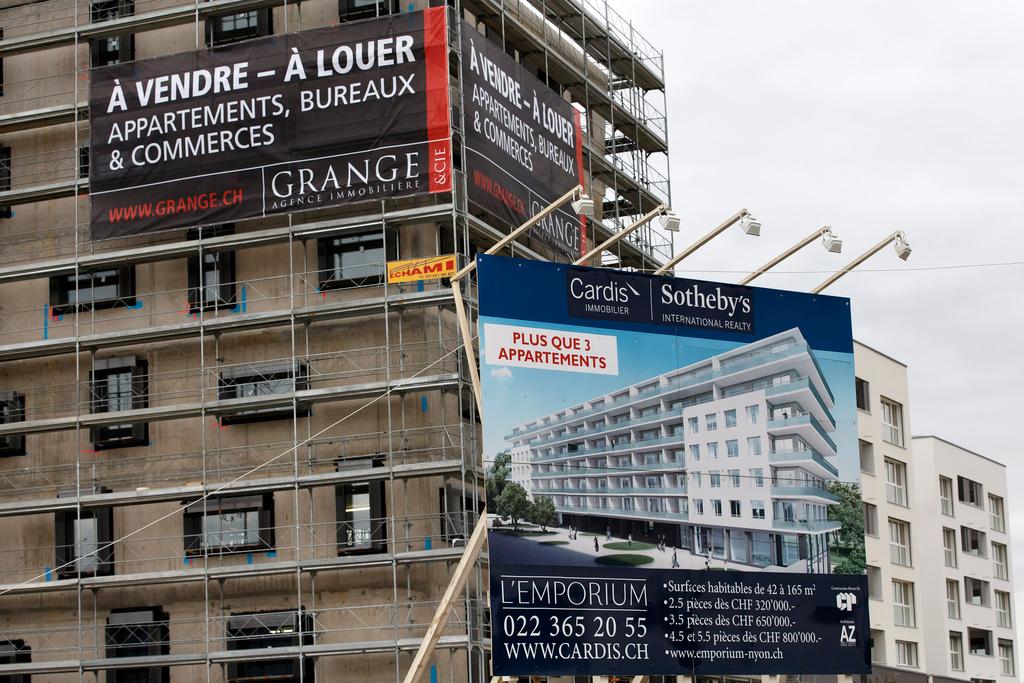Tough times forecast for Swiss real estate market

The booming housing market in Switzerland is expected to cool this year, driven by an immigration slowdown and home prices proving unaffordable to younger buyers. Credit Suisse bank has forecast a modest 1% rise in prices for owner-occupied property in 2016.
Switzerland has experienced a real estate boom over the last decade with demand for both rental properties and owner-occupied homes increasing dramatically, particularly in cities such as Geneva. Recent negative interest rates have sparked a real estate spending glut as investors go searching for better returns.
But slowing immigration is believed to play a greater role in slowing prices in the short-term, with the number of workers arriving in Switzerland declining 10% last year, Credit Suisse said in its annual real estate survey – this year entitled “Banished from ParadiseExternal link”.
While this phenomenon is likely to have a negative impact on the high-end rental market, the arrival of more refugees – around 17,000 last year, and possibly as many in 2016 – could boost demand for lower cost rental flats.
“Although the demand for rental apartments in 2016 is likely to match that of last year thanks to additional demand from refugees, yield prospects are looking less rosy following a decline in the influx of working immigrants,” the report stated.
“The additional demand for rental accommodation from refugees will primarily put pressure on demand in the lowest price segment, which is already fierce.”
Digital revolution
The bank has repeated earlier warnings that a burgeoning supply of rental flats and office space could hit a brick wall in the near future as demand dries up. On Wednesday, the Swiss construction industry reported a 8.6% drop in turnover last year of CHF18.4 billion ($18.4 billion).
Only in the owner-occupied housing segment, does supply and demand appear to be in equilibrium. In the long-run, Switzerland’s ageing population could also hit the real estate market, the report warns.
The average age of owner-occupiers is 57 due to the inhibitory high costs of buying for the younger generation. From 2018 onwards, Credit Suisse economists have forecast a “demographically-driven weakening in demand, which after a few years could be up to a third lower than it is today”.
The digital revolution is also expected to play a role in the commercial property market with companies increasingly outsourcing back office support functions. “No reversal should therefore be expected in the trends of increasing vacancies and declining rents over the next few quarters,” the report said.
Bad loan fears
Despite the increased demand for mortgages, Swiss banks have been forced to keep their loans in check by a combination of self-regulation and rules imposed by the central bank. It is hoped that these measures will spare Switzerland from the hard landing the real estate market experienced in the early 1990s.
But on Wednesday, UBS bank chief executive Sergio Ermotti told Bloomberg TV that some banks may be overstretching themselves.
“Some banks are over-extending credit at conditions that in my view may also create future potential of risks in the system,” he said. “There are banks that don’t know what to do any longer with deposits so everybody is trying to beat each other on pricing, and eventually this is going to lead into a structural deficit.”

In compliance with the JTI standards
More: SWI swissinfo.ch certified by the Journalism Trust Initiative










You can find an overview of ongoing debates with our journalists here . Please join us!
If you want to start a conversation about a topic raised in this article or want to report factual errors, email us at english@swissinfo.ch.